Dentures – Weatherford, TX
An Affordable Way to Get Your Smile Back
Tooth loss affects millions of Americans every year and can make it incredibly difficult to perform even the most basic tasks throughout the day. At Beacon Dentistry of Weatherford, we have a passion for restoring smiles that is truly unmatched. Now you can show off a grin with pride again. With our full, partial, and dental implant dentures, Dr. Thomas Novak and Dr. Garrett Johannsen will restore your smile, and do so while ensuring both functionality and esthetics. To learn more about dentures in Weatherford or to schedule an appointment at Beacon Dentistry of Weatherford, don’t hesitate to give us a call!
Why Choose Beacon Dentistry of Weatherford for Dentures?
- Long-Lasting & Comfortable Implant Dentures Available
- High-Quality Materials for Natural-Looking Restorations
- Fun and Lively Dental Office Atmosphere
Who’s a Good Candidate for Dentures?

Regardless of how many teeth they are missing, almost anyone can be a good candidate for dentures. The process of getting them begins with scheduling a consultation with one of our Weatherford dentists so they can evaluate your oral health and determine that you are a good candidate for this treatment. If you aren’t a good candidate yet, you may be able to become one after clearing up gum disease through improved oral hygiene and periodontal treatments or receiving bone grafts to reinforce your jaw. Here’s a brief guide to what qualifies one for dentures, but feel free to reach out to our staff if you have any questions.
Effects of Missing Teeth

Tooth loss becomes more common at later ages, and it usually happens due to oral injuries, infections, or genetics. In addition to diminished confidence, self-image, and self-esteem, the loss of a tooth leads to a range of negative oral health consequences such as bone loss in the jaw, the remaining teeth drifting out of alignment, trouble eating and speaking, increased likelihood of further dental injuries and infections, and facial sagging. Replacing lost teeth quickly can prevent or reduce the incidence of these issues while restoring your smile to its original beauty and function.
What Qualifies You for Dentures?

Dentures can be an excellent option for people who have lost one or many teeth, deal with dental sensitivity, or have severe decay as long as their gums and jawbones are sufficiently healthy. Denture patients will also need to commit to a special oral hygiene routine while ensuring that their appliances receive the professional care they need.
The number of teeth you are missing determines the type of denture that is appropriate for you. While full dentures can replace an entire arch of lost teeth, partial dentures can address the loss of one or a few of them. Implant dentures can be a great way to keep your appliance fitting securely so you can speak and enjoy a wealth of different foods without worrying about it sliding out of place. Dentures can also be a more budget-friendly solution than other tooth-replacement methods.
Alternative Tooth-Replacement Options
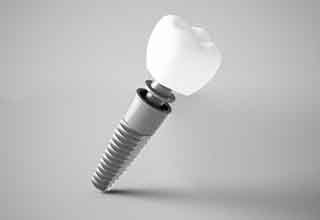
If you aren’t a good candidate for dentures, you may want to explore other tooth-replacement options. We offer alternative solutions such as:
Dental bridges: These appliances work great for patients who are missing one or several sequential teeth. They are secured by dental crowns placed on the teeth on either side of the gap, so these abutment teeth must be healthy if a dental bridge is to be successful.
Dental implants: Dental implants are lifelike dental crowns mounted on titanium posts surgically placed in the bone structure of the jaw. This treatment requires the patient to have strong and healthy jawbones, and while implants are more expensive than dentures, they are permanent.
Types of Dentures

You have a few different options when it comes to dentures. Depending on your individual case, you can opt for the following:
Partial Dentures
Every tooth is valuable to your long-term oral health. When a dental bridge is not enough to restore your smile to the fullest, a partial denture can effectively restore teeth on opposite sides of your mouth. Partial dentures not only prevent neighboring teeth from shifting, but they look more natural than ever before! We’ll customize them to fit your mouth exactly, so you’re never wondering if your denture will remain stable or look natural to those around you.
Full Dentures
While partial dentures rely on neighboring teeth to stay in place, a full denture relies on the overall shape of your mouth as well as the natural suction of the gums to replace an entire arch of teeth. In the beginning, you’ll also need a small amount of denture adhesive as it adjusts to your mouth. Each denture, whether it’s replacing teeth in the top or bottom arch, is designed with a gum-colored base and enamel-colored replacement teeth.
Implant Dentures
For a more stable denture that lasts longer than traditional methods, you’ll find many benefits from an implant-retained version. After placing a series of dental implants throughout the jaw and attaching a customized restoration, you can expect 70 percent of your chewing function to be restored. Even better, dental implants are designed to last for decades, so you won’t have to worry nearly as much about getting your denture replaced! With the All-on-4 treatment, you can even get your smile back the same day as your implant placement surgery. All these benefits are often available at the time teeth are removed. In other words, you're never missing teeth in your smile.
The Benefits of Dentures

There are many reasons why you may want to choose dentures as a tooth replacement option, especially when the alternative is going without a complete smile. In addition to being a timeless, affordable choice, dentures offer many benefits that are difficult to ignore.
Psychological Benefits

When you don’t have a full set of teeth, you may feel self-conscious and want to hide your smile from view. In addition to not spreading joy to others, avoiding smiling can deeply impact your own mood. In fact, studies have found that those who smile often tend to feel happier than those who don’t. Therefore, if you have teeth you’re willing to show, you’ll be free to give your mood a boost with a confident smile.
Clearer Enunciation

Although you can limp along in a conversation without your teeth, sometimes clear communication can be challenging. You can feel isolated as well when unable to voice your thoughts or connect with others. Fortunately, dentures can enable you to speak more clearly, whether you’re simply ordering food at a restaurant or sharing a funny story with friends and loved ones.
Improves Nutrition

If you’ve eaten without teeth, you know how difficult it can be to maintain a healthy diet. Your main food options are soft and tend to be more processed, which usually means less nutrition. On the other hand, when you have prosthetic teeth that fit properly in your mouth, you can eat most food in small bites, including raw fruit and vegetables, whole grains, and more, giving you the vitamins and minerals your body needs to function optimally.
Preserves Oral Health

Whether you have remaining teeth in your mouth or not, dentures are essential for keeping your mouth as healthy as possible moving forward. Partial dentures keep teeth in their proper alignment and prevent shifting, which helps preserve these teeth and your bite. Although traditional dentures do not necessarily stop the natural process of jawbone degradation over time, they keep facial muscles engaged and strong, which is essential for oral function.
Expands Opportunities

In social and professional situations, others will see and judge your smile. If you have missing teeth, certain opportunities, such as meeting new people or getting a better paying job, could be closed to you. In contrast, having dentures can give you confidence and give a positive impression on those around you, opening doors for new experiences and chances for growth.
How Dentures Are Made

Once you’ve decided to proceed with dentures, you may have to wait a few weeks before you receive your restoration. This is because they are built from the ground up to be completely customized just for you, which can take some time. We believe that understanding more about how they’re made can help you handle the wait time and appreciate your artificial teeth that much more.
Keep reading below to learn more about how these prosthetics are made, and feel free to contact us for more information.
What are Dentures Made Of?

Whether you’re receiving a full or partial set, your dentures are comprised of two main components. Below is a more detailed description of each:
- Base. The base of your restoration forms the foundational structure that gives it its shape and holds the pontics (artificial teeth). This portion can be made from several materials, including nylon, porcelain, metal, composite resin, and acrylics. Full dentures most commonly utilize acrylic because it can be colored and carved to match your gums. Partial sets often include metal clasps to anchor to neighboring teeth.
- Pontics. Artificial teeth are usually created with resin or porcelain because both can be customized to be the same color as your teeth and reflect light similarly to your natural enamel. Porcelain is the tried-and-true material but may not be recommended for partial dentures because it can abrade neighboring teeth.
The Denture Creation Process

Our team will take impressions and images of your mouth that we send to a special laboratory, which uses them to build your one-of-a-kind dentures. Then, their technicians typically follow the following step-by-step process:
- Step #1: They use the scans and impressions to create a plaster model replica of your mouth that will be used to ensure your prosthetics are the right shape and size.
- Step #2: A wax gum line is placed on the cast.
- Step 3: Artificial teeth are set into the wax gums using an articulator. The tech then carves and shapes the base to resemble the soft tissues in your mouth.
- Step #4: This wax version is sent back to use so we can schedule you for an initial fitting. We’ll note any changes that need to be made and send them back to the lab for finalization.
- Step #5: Your dentures are placed into a flask that’s put into hot water to melt the wax away.
- Step #6: Holes are made in the pontics so that the acrylic can attach to it, and a liquid separator is added to the plaster to ensure none of the material sticks to it. Then, acrylic is injected into the flask to replace the wax that was melted off.
- Step #7: The plaster is carefully removed from your prosthetics piece by piece using special lab instruments to reveal your restoration underneath. Then, your acrylic dentures are placed in an ultrasonic bath for a thorough cleaning.
- Step #8: Excess acrylic is trimmed away, and your artificial teeth are polished to a shine.
- Step #9: The finished dentures are sent back to us so we can schedule a final fitting.
Adjusting to Your New Dentures

It’s natural to want to enjoy meals and conversations with family and friends the moment you return home with your new restoration. However, it can take about a month for your tongue and the supporting muscles in your mouth to learn to chew and enunciate sounds with dentures in your mouth. You may feel somewhat tender, too, until your mouth becomes desensitized to supporting them all day.
To ease yourself through this transitional period, you might try sticking to softer foods that won’t irritate your gums. You can also apply a denture adhesive cream that forms a layer of cushion to reduce any potential discomfort.
Understanding the Cost of Dentures

The cost of dentures isn’t exactly the same for everyone. Our team will create an estimate after examining your mouth and figuring out what your specific needs are. You can count on us to be transparent about the costs so that there aren’t any unwelcome surprises later, and we’ll work with you to make paying for your care as easy as possible. Below are some of the basics you should keep in mind when calculating the final cost of dentures.
Factors That Affect the Cost of Dentures

Some patients will need to pay for tooth extractions and other types of preparatory work before they get dentures. Then, when it comes to the cost of the actual restoration, the number of teeth you’re missing will need to be considered; a partial denture that only replaces a few teeth will not have the same price as a full denture that replaces the entire arch.
The materials used to make the denture matter as well. Dentures made out of cheaper materials are more likely to break or need to be replaced early. It’s usually better to invest in dentures made out of higher-quality materials that you can rely on.
Are Implant Dentures More Expensive?

There’s no denying that dental implants will naturally add to the cost of your dentures, but the benefits they offer are well worth the price. They’re more reliable than traditional dentures since they won’t slip at awkward times, and they stimulate the jawbone to keep it healthy. You also don’t need to worry about replacing implant dentures as often, as they can last for decades with the right kind of care.
Does Dental Insurance Cover Dentures?

Not all dental plans are the same, so you’ll want to check with your insurance provider. That said, most of the time dentures are at least partially covered by dental insurance. The majority of plans consider them a major restorative treatment and provide around 50% coverage.
Our team can go over your benefits with you to make sure that you fully understand the savings you’re entitled to. We can also handle any necessary paperwork on your behalf so that you don’t have to worry about filing a claim after your visit.
Other Options for Making Dentures Affordable

Uninsured patients can sign up for our Beacon Dentistry of Weatherford Savings Plan. Among other benefits, you can enjoy a 15% discount on general dental procedures. Another option for managing the cost of care is to apply for a third-party financing plan. Our office works with CareCredit and Scratchpay, which both let you choose a plan that fit your budget so that you can pay for a given dental treatment in a series of installments. Our team can review all of these options with you in more detail during your appointment.
Dentures Aftercare

While dentures aren’t natural teeth, that doesn’t mean you can just neglect them. These prosthetics need proper care to work as they should! Unless you look after them, they’ll quickly fail and force you to spend time and money on tooth replacements. The good news is that our practice can help you with tips on caring for dentures in Weatherford. To learn them in detail, simply keep reading or book a consultation with us.
Remove After Eating
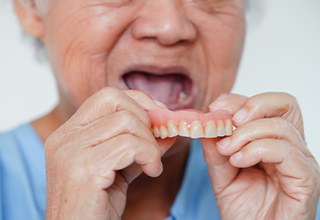
For starters, you really ought to remove and rinse your dentures after meals. The habit removes plaque and many other "leftovers” that build up from eating and drinking. As a result, it greatly reduces your risk of oral issues like gum disease and similar infections.
When doing these rinses, please avoid using hot water. The truth is that high temperatures can warp a denture’s material and distort its fit. Should that happen, you’d likely have to get a replacement that costs you time and money.
Clean Your Restoration
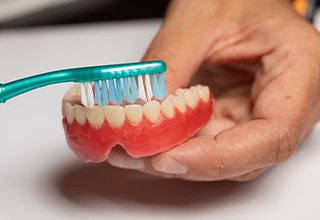
With dentures, you would want to practice once-daily cleanings as well. These sessions would remove the plaque and bacteria that rinses can often miss.
A standard denture cleaning is pretty simple, all things considered. It just requires that you brush your prosthetic (after removing it) with a soft-bristled toothbrush. Still, please use liquid hand soap instead of regular toothpaste; the latter is too abrasive for dentures. You should also rinse the dentures before returning them to your mouth.
Keep Your Dentures Safe
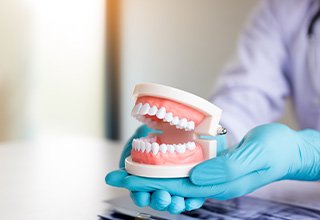
Dentures are often durable, but even they can break sometimes. A simple accident or rough handling would be enough to damage their material. That being the case, remember to keep your dentures safe.
Several methods would help you protect your dentures. For instance, you could place a towel in your sink while cleaning them; the cloth would cushion them from falls. Similarly, it’d be a good idea to keep your dentures away from little kids or pets.
Remove Dentures When You Sleep
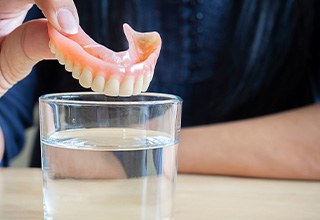
Sleeping with your dentures may sound convenient, but it’s not a good idea. You should try to remove them before bed and (if possible) soak them in a solution overnight.
You see, using dentures constantly just isn’t good for you. Wearing them overnight would restrict your gums’ circulation and irritate your mouth tissues. That habit would also increase your tongue’s plaque levels, making issues like gum disease more likely. It could even elevate your risk for pneumonia!
Notice Changes

To ensure your dentures stay functional, always monitor them and your mouth for changes. Your prosthetics may cause problems later (mouth sores, gum irritation, etc.) that require dental care.
If a change in your dentures damages them, please visit us for repairs. Attempting a “DIY” fix could further harm your restorations and oral health. On the other hand, our dentists could use their knowledge and skills to reline or replace dentures.
All-on-4 Dentures
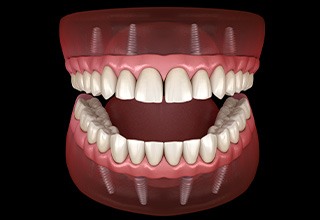
Since All-on-4 dentures can’t be removed, they have different aftercare methods. The most common ones include:
- Twice-Daily Brushing – By brushing these dentures twice daily, you’ll clean between the restorations and your gums.
- Once-Daily Flossing – Try to floss between your denture’s teeth (either with a threader or a water flosser) once daily.
- Regular Mouth Rinses – To prevent tartar buildup on your dentures, make sure to rinse them (at least) once daily.
Dentures FAQs

By now, you may be considering dentures in Weatherford. That’s only natural — these prosthetic teeth effectively restore smiles, after all! Still, perhaps you want to know more about dentures before committing to them. There’s a good chance you wouldn’t feel confident in treatment otherwise. Thankfully, Beacon Dentistry of Weatherford can meet your need: here are the answers to some frequently asked denture questions you might have. Read them over and learn about the restorations they concern! Alternatively, you can always also call our office for details.
What is the Average Age for Dentures?
True enough, tooth loss is by no means inevitable for most patients. Even so, it’s still a fact that dentures are far more common among older people.
You see, people are likelier to lose teeth as they age. According to the National Center for Health Statistics, 66% of Americans 40-64 years old are missing at least one tooth. Meanwhile, the American Dental Association has found that 57% of people ages 65-74 wear dentures.
Despite the need for dentures increasing with time, people of all ages can qualify for them. It’s just a matter of whether the person suffers from missing teeth.
Will It Hurt to Get Dentures?
Should you need tooth extraction before a denture treatment, you’ll likely face soreness after the surgery. If you do, though, you can simply take your prescribed pain reliever(s) as directed. The unpleasant sensations will then fade after 3-5 days.
When receiving the dentures themselves, you may experience some irritation. This effect is normal, as your mouth needs to adjust to the new appliance. As for how long the discomfort lasts, the timing varies from person to person; it can persist for months in many cases. The adjustment may take longer if you switch to a new set of dentures.
Can I Sleep with My Dentures?
While you can certainly try, sleeping with your dentures is not a good idea. Dentists suggest taking them out at night when you go to bed.
You see, leaving dentures in your mouth overnight is a health hazard. By restricting the circulation in your gums, it causes soft tissue irritation and accelerated ridge resorption. Plus, it gives the moist space beneath dentures more time to breed harmful bacteria. Consequently, you’d suffer from poor oral hygiene and higher plaque levels.
What Can’t You Eat with Dentures?
Despite their role as restorations, dentures don’t do well with certain foods. As such, you should try to avoid those like the following:
- Sticky Foods: Items like peanut butter and gummy candies can pull dentures out of place. They’re thus tricky to chew and let food bits get stuck beneath your restorations.
- Hard Foods: Nuts, popcorn, apples, carrot sticks, corn on the cob, and other hard products can damage dentures. Though okay to eat on occasion, you should avoid them for the most part.
- Tough Meats: Because steak and pork chops require lots of chewing, they put a lot of stress on both your dentures and your gums.
I Need a Checkup & Cleaning I am Looking for a Dentist for My Child I am Concerned about Bleeding Gums I Have a Cavity or Broken Tooth I am Missing One or More Teeth I am Unhappy with My Smile I Want a Straighter Smile I am Scared of the Dentist I am in Pain & Need Help View Our Services

